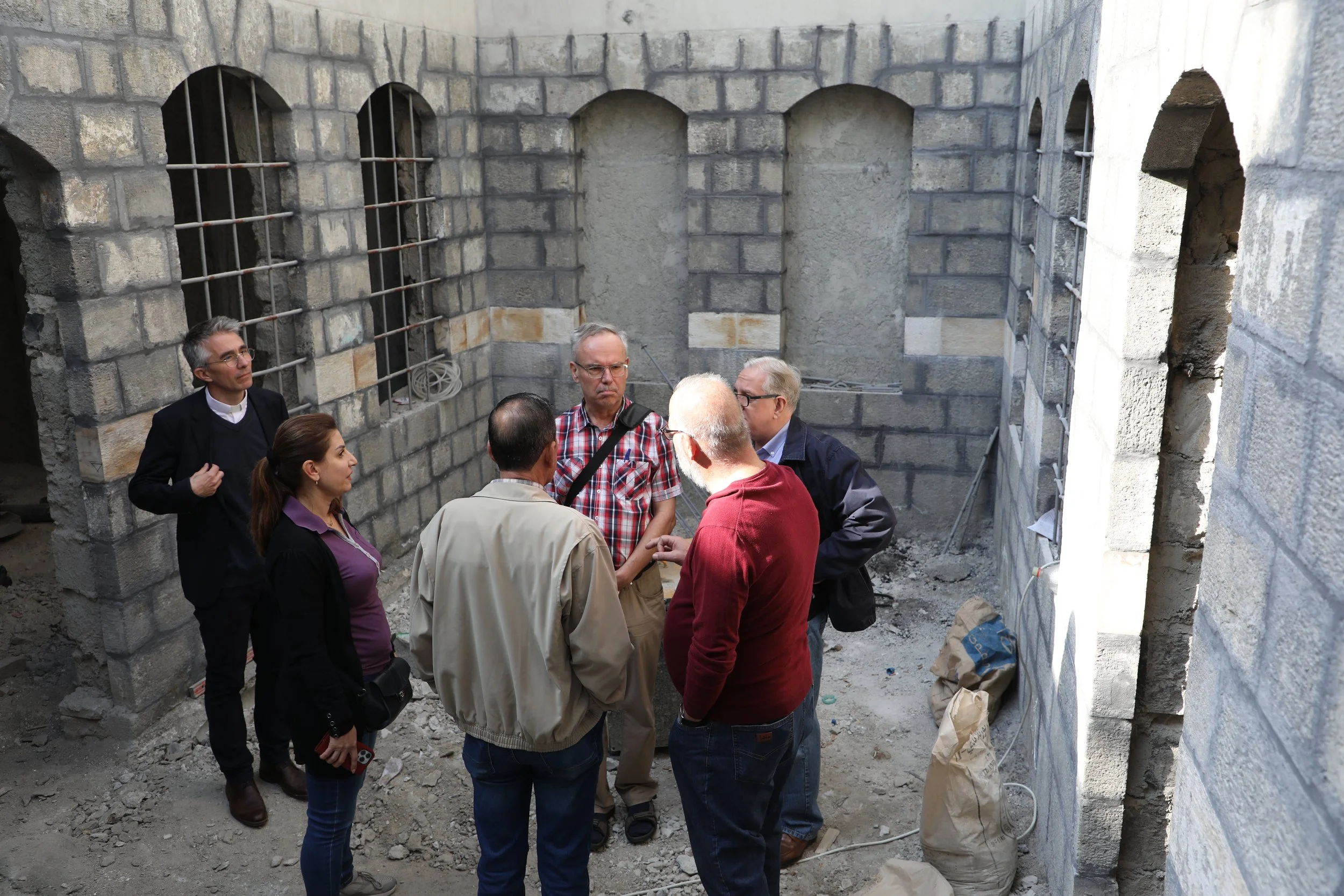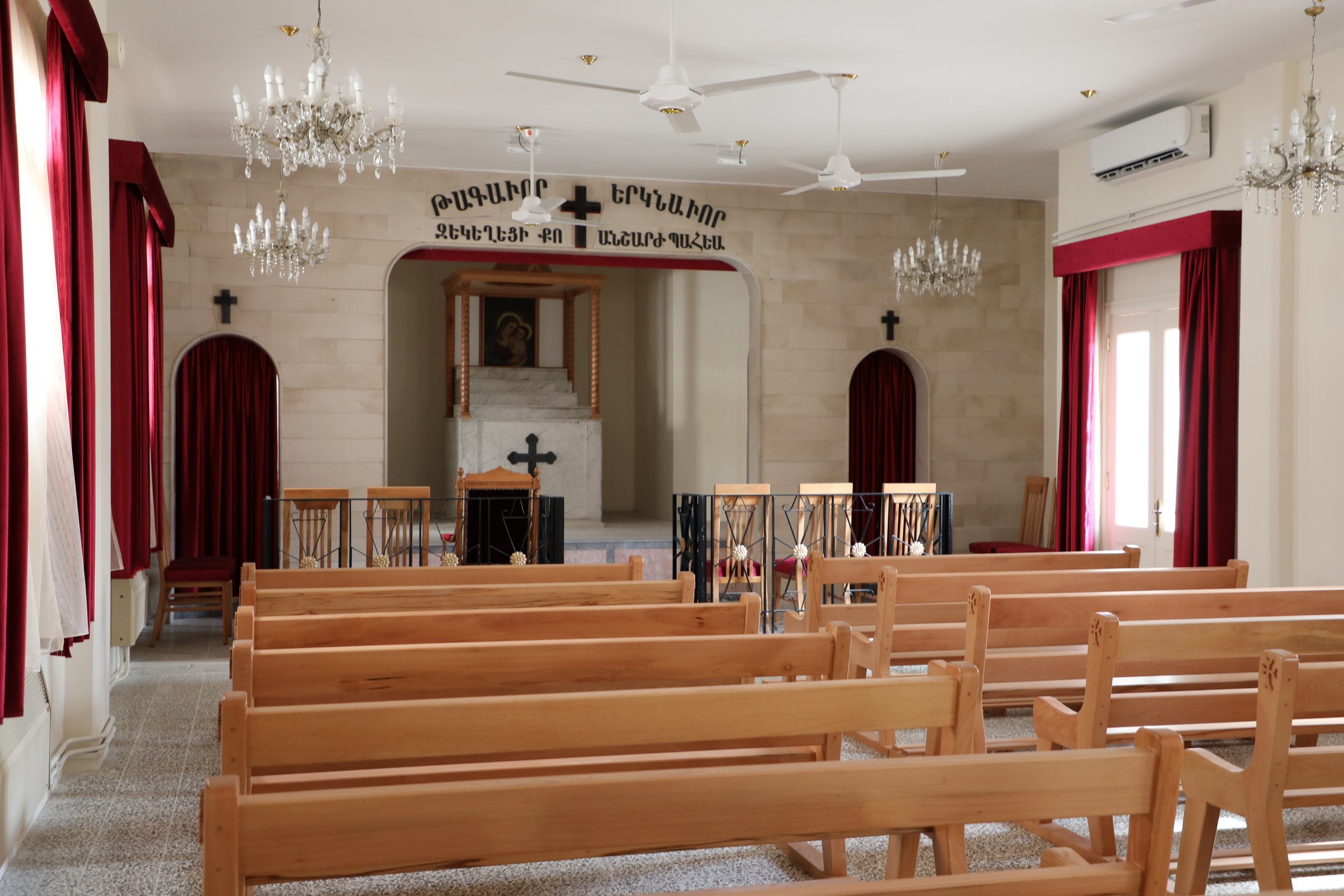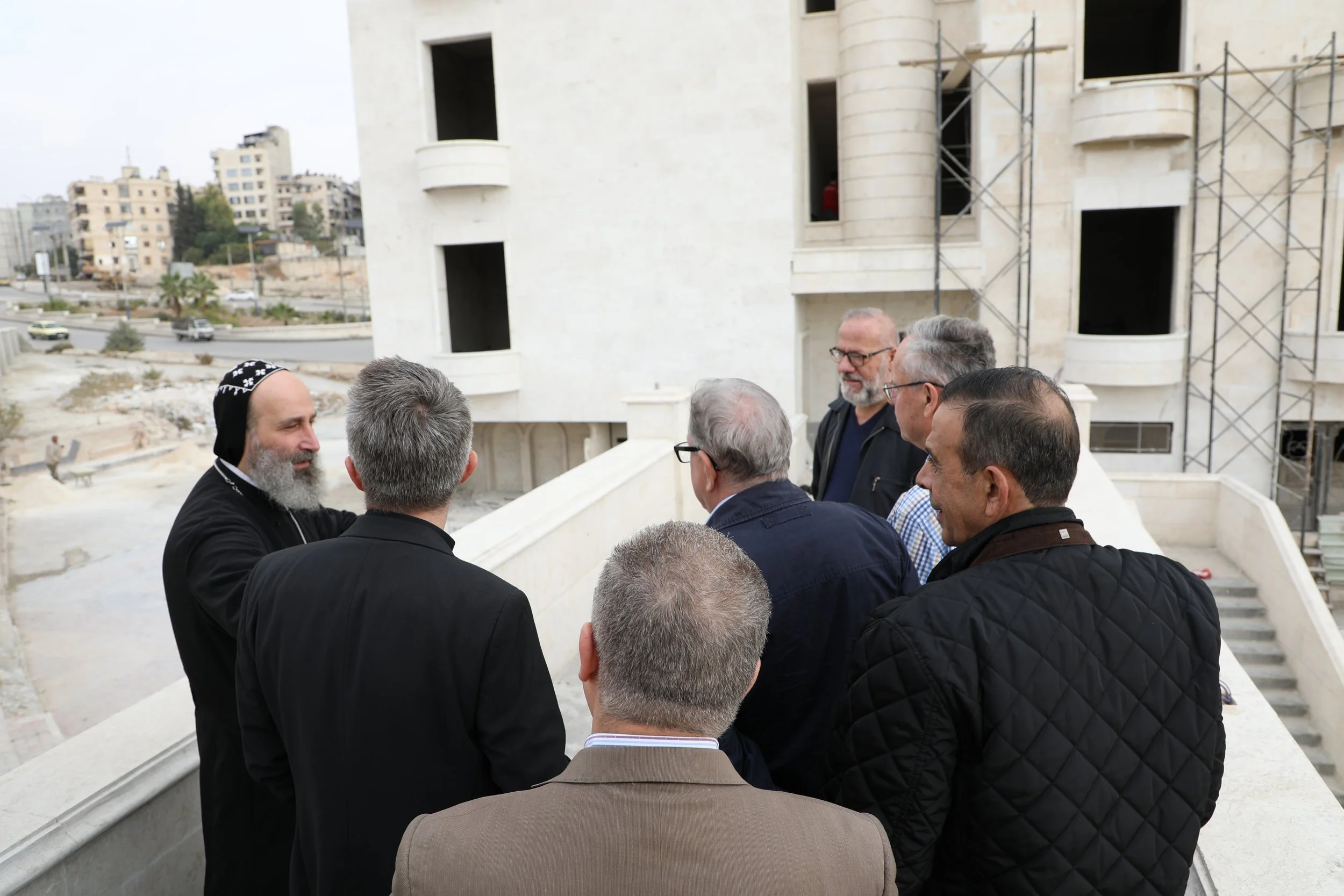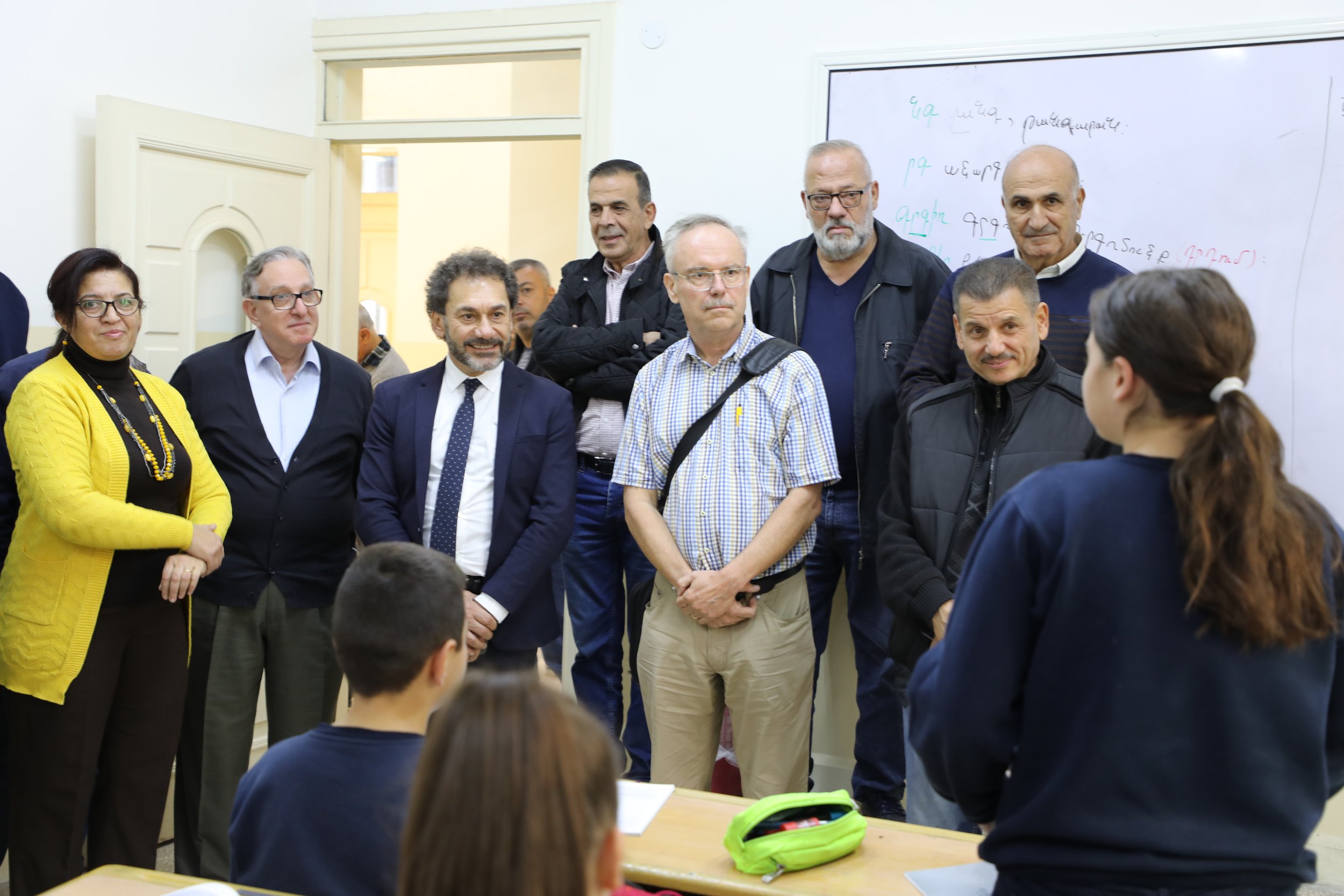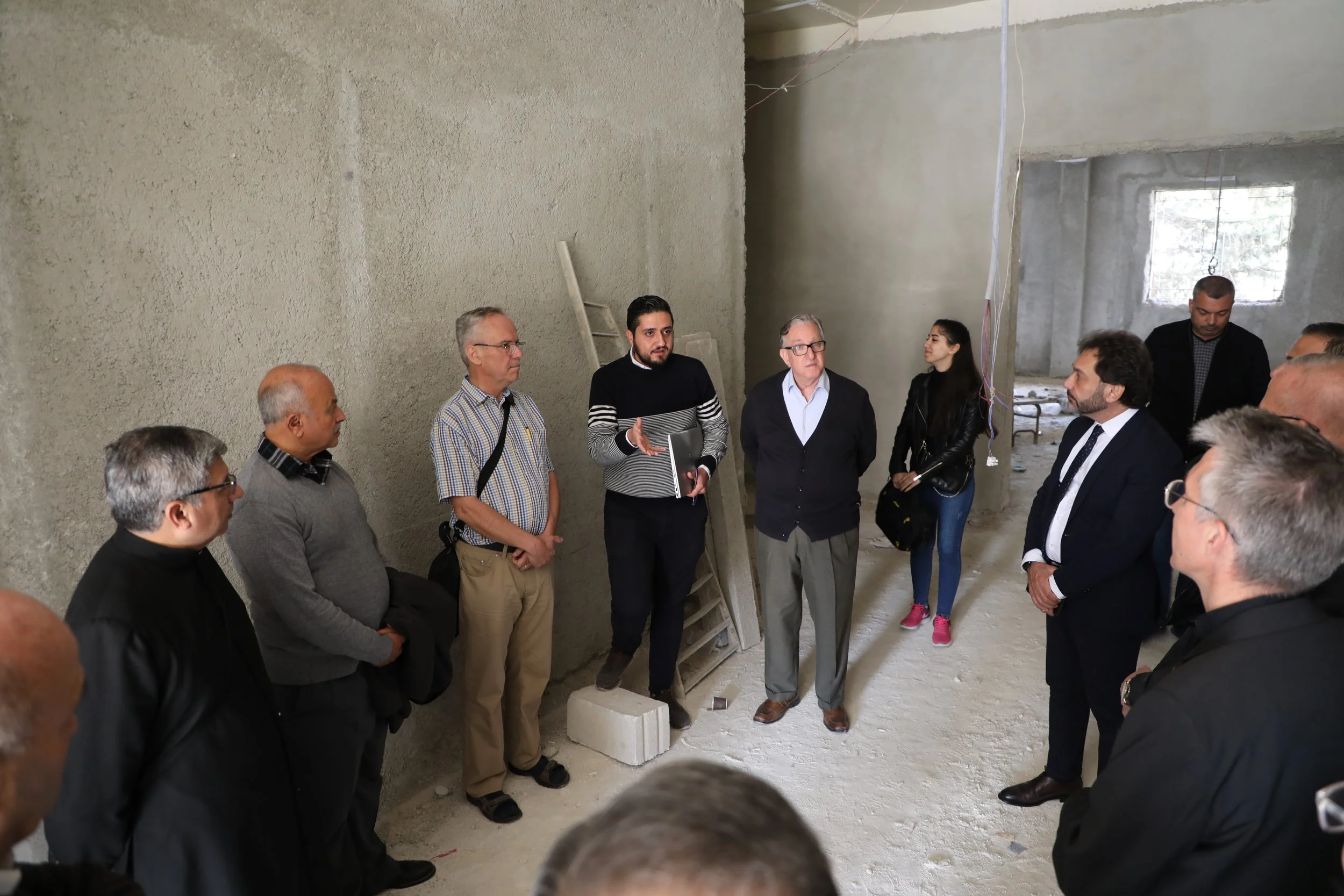Restoration of Ecclesiastical and Social Institutions... An Invitation to Return to the Homeland
A Field Tour Held by MECC and “Kerk in Actie” in the Netherlands Delegation
Report by Lama Halawi - Damascus office
Photos by Paula Antoun
Eleven years have passed since the outbreak of the severe war in Syria which have took the lives of thousands of Syrians. Not only people have been affected but also stones and buildings. The war has caused massive damage in infrastructure and impacted the economy. As well as, house, religious, educational and medical institutions have been destructed.
If stones in Syria could speak, it would talk about a history and civilization which goes back thousands of years, witnessing for a Christianity which was spread from this country to the world.
Amidst this deepening human crisis, the Church's first challenge was to shine a light in the darkness and sorrow hope in the midst of despair.
The Middle East Council of Churches, in cooperation with “Kerk in Actie” organization in the Netherlands, launched the “Restoration Fund for Rehabilitation of Faith-based Social Services & Religious Infrastructure Damaged During the Crisis in Syria” program in 2020. It aims at supporting the Church in protecting its children in a country which has been exhausted from long years of war, through restoration and rehabilitation projects which help people rise from the rubble.
This program has reached its third year. Since its launch, many Churches and educational institutions related to various Christian denominations have been restored. During these years, a follow up was made by MECC and “Kerk in Actie” through periodic field visits. The latest visits were held to the governorates of: Rural Damascus, Homs, Aleppo and the city of Kessab.
Bringing Life Back to the Dead Stone
A delegation from “Kerk in Actie” and the MECC Service and Relief – Diakonia Department, visited the implemented projects within the program which aimed to restore life in properties.
The tour started at the "Care Home", an old Arab house related to the Syriac Catholic Diocese, which is currently being rehabilitated to become a house for university students.
His Eminence Syriac Catholic Archbishop of Damascus Youhanna Jihad Mtanos Battah said, “Syria is like the Samaritan who was attacked by strangers, wounded and left alone. Some people wanted to help Syrians, and we aim to restore smiles and hope among our youth and people who feel forgotten and abandoned after the war.”
Then, a visit was made to the St. Barbara Elderly Center related to the Maronite Church. The delegation also visited Maaret Saidnaya in Damascus Countryside, where the Patriarchal Vicar Archimandrite George Jbeil welcomed them at the St. Elias Monastery. In fact, one of the Monastery’s halls was renovated so it can be ready to receive youth camps from various Churches, and to organize many social events.
The first day’s tour ended with a visit to "Al Baraka Center" for youth activities in the town of Maaloula in Damascus countryside, which is related to the Greek Orthodox Patriarchate. During the visit, the delegation was informed of the restoration project proposals which could be implemented in the future.
A Beacon of Hope: Immigrants Return Back to Their Land
In Homs Governorate, the tour began in the town of Sadad, at the St. Anthony the Great’s Monastery affiliated to the Syriac Orthodox Patriarchate. The Monastery is being restored so it can light up the lives of Sadad people and bringing hope back to them.
Metropolitan of Homs, Hama, Tartous and its Dependencies Archbishop Timothy Matta Al-Khoury praised the efforts made through the program of rehabilitation of faith-based social services and religious infrastructure damaged during the crisis in Syria. He described it as “special work because it aims to revive Churches, Monasteries or related institutions, and thus revive spiritual life and human activity in these holy places.
The Eastern people’s relation to their Churches is essential. All those who were forced to leave due to war and displacement, are thinking firstly to help and build the Churches before their houses. This program which aims to rehabilitate the infrastructure of the worship places or its related institutions, would help people connect to the Church and also assist the Church to fulfill its spiritual, human and social mission through the monuments which are being restored. Thus it is a source of hope and an opportunity for many people to return to their homeland ".
The next destination was to St. Mesrob Church and Ishakian School, which were restored as part of the project last year.
Involving Youth in the Church
Before heading to Aleppo, the delegations visited the Holy Spirit Church at the Syriac Catholic Patriarchate, in the middle of old Homs. It was badly damaged due to the war and is now being restored with activity rooms, in addition to providing the Patriarchate with all solar energy equipment and elevator maintenance.
In Aleppo, the delegation conveyed the greetings of the MECC Secretary General Dr. Michel Abs congratulating His Eminence Bishop Ephraim Maalouli on his enthronement as Metropolitan of the Greek Orthodox Archdiocese of Aleppo, Alexandretta and Dependencies, and congratulating Archbishop Boutros Kassis on his enthronement as Archbishop of Aleppo and Environs.
Al Rahma Home for Elderly affiliated to the Syriac Orthodox Patriarchate is also part of the implemented projects within the “Restoration Fund for Rehabilitation of Faith-based Social Services & Religious Infrastructure Damaged During the Crisis in Syria”.
His Eminence Bishop Boutros Kassis mentioned that the Patriarchate chose firstly Al Rahma Home for Elderly to be restored as part of the rehabilitation program. Before the war, the home was providing services to the marginalized and vulnerable groups in the society, especially elderly.
His Eminence also said, “the house helps the Church fuflill its social mission, which must always stay ongoing, especially during war, harsh and difficult times."
Education Is a Weapon Against War
As part of the “Restoration Fund for Rehabilitation of Faith-based Social Services & Religious Infrastructure Damaged During the Crisis in Syria”, MECC wanted also to restore many schools, such as the Private Syrian Secondary School affiliated to the Armenian Orthodox Patriarchate, which was rehabilitated last year. As well as, restoration works are being implemented this year at the “Dar Al-Salaam” school which is affiliated to the same Patriarchate.
In addition, work also included the establishment of centers aiming at teaching students from different academic levels, and also offering English language, computer and professional courses which would help the beneficiaries enter the labor market, all for free.
The Lady of Annunciation Church affiliated to the Latin Church helped in the implementation of this project. Noting that it benefited also from the MECC program through which the Church’s basement was restored so it can be ready to support students who are unable to afford private lessons or institutes’ fees.
This center, which was renovated last year, welcomes many students and youth who want to learn English and computer skills, so that they can enhance their knowledge and thus increase their chances of getting a job.
The same Church is working this year, in cooperation with the Middle East Council of Churches, to renovate the “Working Jesus” home, which will be devoted to similar activities.
Many Syrians who have defied the scourge of war and insisted on staying in their country are looking forward to rehabilitating all the Churches and related institutions which were destroyed during the war. Hence, their hope and tired soul will be restored, affirming that life will return to normal as it was before the war. All the renovated buildings and Churches are not only a light illuminating their path, but are also carrying the memories of all Syrian people.




